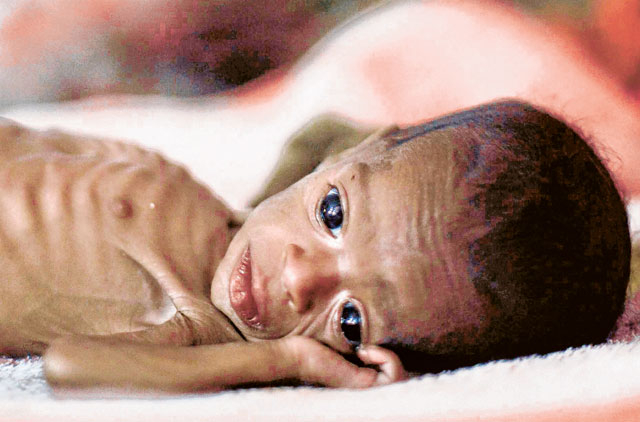New Delhi: India's parliament on Monday passed a flagship 18-billion-dollar programme to provide subsidised food to the poor that is intended to "wipe out" endemic hunger and malnutrition in the aspiring superpower.
The Food Security Bill - a key scheme seen as a vote-winner by the ruling Congress party ahead of national elections next year - was adopted in the lower house after a nine-hour debate.
The draft law will provide food grains to nearly 70 per cent of the population, or 800 million people, for as little as one rupee per kilo.
Despite decades of fast economic growth, India still struggles to feed its population adequately, with more than 40 per cent of children malnourished according to a survey published last year.
In a rare speech in parliament, Congress party chief Sonia Gandhi told MPs to send a message to the world that India was ready to eradicate malnutrition, which Prime Minister Manmohan Singh has described as a "national shame".
"The big message which will go out to the country and rest of the world is clear and concrete: that India is taking the responsibility of providing food security of all its citizens," she said.
"Our goal for the foreseeable future must be to wipe out hunger and malnutrition from our country," Italian-born Gandhi told lawmakers to applause, having championed the programme as cornerstone of the ruling party's welfare agenda.
Gandhi was admitted to hospital hours after her speech apparently suffering from a fever.
Congress leader Renuka Chowdhury told television channel Zee News that the 66-year-old, who underwent surgery in the United States for an undisclosed illness in 2011, was exhausted.
She needs some rest after working "under tremendous stress", Choudhury said.
India already runs the world's biggest food distribution system covering hundreds of millions of people, but the Food Security Bill will offer grains at lower prices and attempt to better target the needy.
The bill, as laid out in a government draft which was amended on Monday, was implemented through an executive decree in July but needed to be passed in the national parliament to become permanent.
It must now be debated and approved by the upper house before being signed into law by the president. The bill is likely to be approved pending amendments.
But the main opposition Bharatiya Janata Party attacked the government, saying the bill did not go far enough to cover more of the country's population, but ultimately voted in favour.
"We will support it today, but we wait for the day when we can enforce a better bill," Sushma Swaraj, leader of the opposition in the lower house, said.
Murli Manohar Joshi, a senior BJP leader, said the bill was an attempt by the Congress to grab votes rather than end hunger.
"This is not a food security bill, it is a vote security bill," he said.
The Congress party is expected to face a tough time at the ballot box next year, having spent much of its second term struggling with a string of graft scandals involving ministers.
Critics of the food programme say India can ill-afford such a costly subsidy burden at a time when economic growth has slowed to a decade-low.
The government says the programme will add 230 billion rupees ($3.6 billion) annually to India's existing 900-billion-rupee food subsidy bill.
The central bank has warned that the increased public spending could deepen the government's deficits and stoke already elevated inflation.
Opponents also argue that extra resources will be funnelled into the Public Distribution System which is notoriously corrupt.
Food minister K.V. Thomas had urged MPs to pass the bill, saying it would help plug holes and repair "damages and leakages in the central procurement system".
Gandhi, widow of slain former premier Rajiv Gandhi, added that the bill "puts pressure on (the) executive to be more responsible and accountable and also puts in place credible mechanism to redress grievances".













